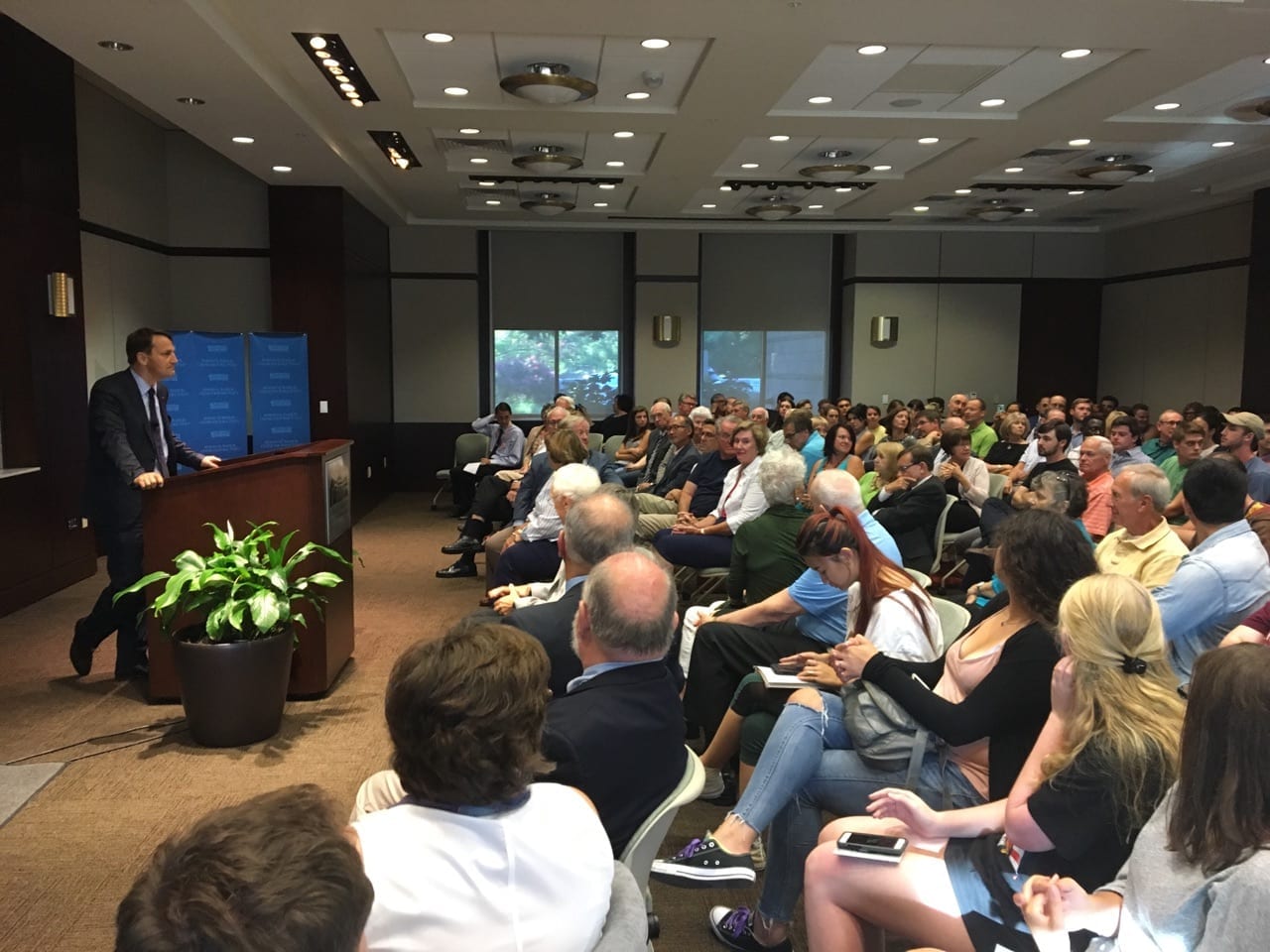Poland’s Radek Sikorski Compares Post-Brexit EU to Post-Civil War U.S.
Polish journalist and politician, Radek Sikorski, spoke at the Howard H. Baker Jr. Center on Sept. 21.

Written by Bethany Daniel and Mckenzie Manning
The Howard H. Baker Jr Center saw an impressive turnout for an Ashe Lecture featuring Polish journalist and politician Radek Sikorski on Wednesday, Sept. 21.
As Minister of Foreign Affairs within Donald Tusk’s cabinet between 2007 and 2014, and Marshal of the Sjem from 2014 to 2015, Sikorski had much to say regarding the United States’ current role in Europe.
According to Sikorski, the United States and Europe share a destiny because of similar values, mutual trade, and cross investment.
“Elsewhere in the world you may have your affairs. To [Europe], you are married,” said Sikorski. He worked in close proximity to Victor Ashe, former Knoxville mayor and Ambassador to Poland, to reach an agreement about a U.S. missile defense system, Aegis Ashore, in Poland. Teams broke ground on the defense complex just two months ago and are expecting the project to be operational by 2018. Aegis Ashore is the land-based counterpart to the Aegis Ballistic Missile Defense System, a sea-based defense system.
“The fact Victor Ashe was known to be a personal friend of the President of the United States meant that we were able to negotiate some difficult moments,” said Sikorski, regarding Aegis Ashore, “and it is in no small measure that through Victor’s service to his country we were able to conclude that complex agreement.”
Shortly after Russia’s 2008 invasion of Georgia, the United States and Poland reached an agreement. In 2009, Sikorski went on to express concern about an imminent threat to Ukraine and Crimea, approaching the United States four years before the annexation of the latter state.
Sikorski also addressed Brexit, the narrowly passed referendum which allowed British to leave the European Union.
“Contrary to media portrayal, it is not a divorce. A divorce implies equal parties. It’s not even a marriage but a club. And one very important member of the 28 has decided to depart,” said Sikorski.
He spoke hopefully about the state of the European Union after Brexit, stating that the European Union would still decide the policies, and Britain would have to adjust in order to cooperate with the 27-nation club.
Sikorski said the European Union is now in a way parallel to the earlier stages of the U.S. in the post-civil war era.
“The European Union is somewhere between the Articles of Confederation and the Constitution,” said Sikorski. “There are reasons why you Americans moved from the Article of Confederations to the Union, the reason being that it wasn’t working. Our states, just like your states, cheat.”
Demonstrating the closeness of Europe, he recalled the lack of border control between neighboring states and the ease with which tourists could move between one and another.
“That freedom is contingent on a sense of control of the perimeter so that we trust one another to move around our countries,” said Sikorski, “but that the bad guys don’t come in.”
Reacting to an audience question, Sikorski cited the necessity for proportions and adequate management of the refugee crisis. He acknowledged the difficulty of the situation but supported refugee acceptance.
“If migration destroyed countries, the United States wouldn’t be what it is today,” said Sikorski.
Endorsing the freeness of these borders and the unionization of Europe, Sikorski urged his audience to draw from the experience of the US and sympathize with the growth of the European Union.
“You, having this experience, of building a union that is now a super power,” said Sikorski, “you should have some sympathy for us, trying to build something that will not be like the United States, but that will be a political union which could be an important partner for the [United States] in carrying the burden of leadership.”
Sikorski said he hoped the European Union would continue to flourish and foster a mutually beneficial relationship with the U.S.
“I thought him bringing in Russian issues and Putin’s views to be really interesting,” Harrison Davis, a UT student, said. “His background of who he is, where he came from and what he’s done was really interesting too.”
Featured image by Mckenzie Manning
Edited by Kaitlin Flippo

